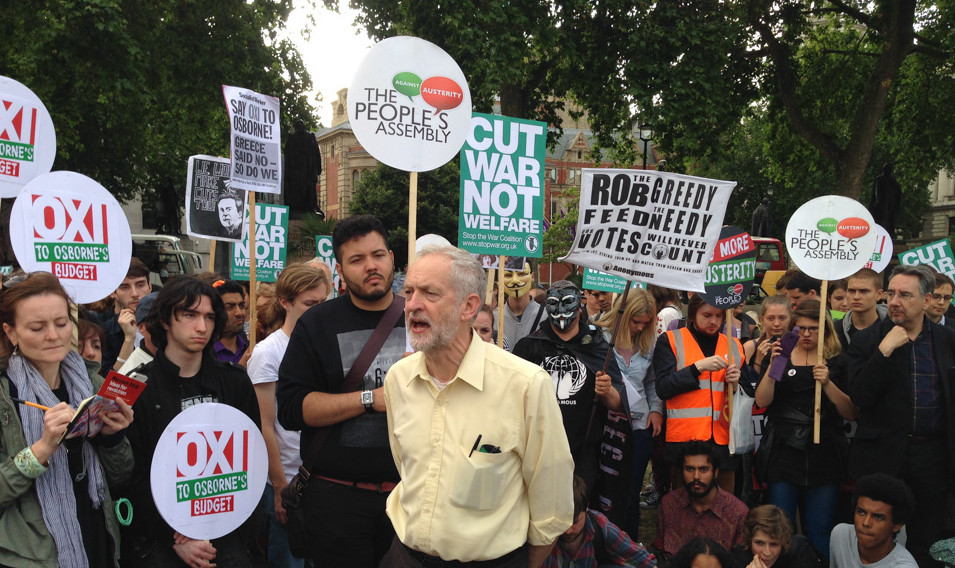Amid a flurry of impatient press members and anxious voters, representatives of Britain’s Labour party gathered at a special conference on September 12 to formally announce the victor of the party’s leadership election. Jeremy Corbyn, who since 1983 has represented greater London’s Islington North constituency in Parliament, had won, and the announcement sent the nation into a political frenzy. The most liberal of the four contenders, Corbyn had entered the race to give the British people what he called a “proper choice” – only to be deemed a dark horse candidate on account of his strongly leftist views. Gradually, however, polls began to track a steady rise in Corbyn’s popularity, and, after months of proclaiming himself as a party rebel and emphasizing his status as a government outsider, Corbyn emerged from the conference as the head of Britain’s opposition government and Labour’s foil to the stalwart Conservative prime minister David Cameron. The official announcement of his victory merely confirmed the results of prior polls, but nonetheless astounded citizens and politicians alike.
Corbyn replaced longtime Labour leader Ed Miliband, who stepped down after his party lost last May’s general elections to Cameron’s Conservatives. Miliband’s resignation left the identity and the future of the party very much in question. Rather than dispel such insecurities, the leadership election appears to have raised more questions than answers. Within the party, reactions to Corbyn’s victory have ranged from great enthusiasm to utter horror. Some Labour MPs have turned to social media to offer resounding support for Corbyn; others have utilized social media in order to resign from shadow cabinet positions, calling the future of party unity into question.
As Corbyn claimed his new position and prepared to tackle his first week on the job, the reactions of politicians, the press, and the public highlighted the unusual circumstances that outlined his path to victory. On the surface, Corbyn snatched up the position by an outstanding margin: he garnered 59.5 percent of the leadership vote, almost three times the number accrued by his closest contender. But given Corbyn’s far-left positions, this sweeping victory is more than just proof of personal charisma. Indeed, Corbyn’s victory speaks to the state of liberal politics in the United Kingdom as well as the shifting dynamics of the nation’s political discourse. Corbyn’s far-left brand of politics has fared well in an increasingly polarized Britain. And on the far-right, the fiercely conservative and Eurosceptic UK Independence Party (UKIP) soared from 3 percent to 12.6 percent of the popular vote in this year’s general elections, underscoring the growing strength of an adamantly conservative voice in Britain. Left of Labour, the Scottish National Party (SNP) has enjoyed unprecedented levels of popularity, all but annihilating Labour’s presence in Scottish constituencies and thereby helping the Conservatives best Labour contenders in the general elections.
Ultimately, Corbyn’s unexpected victory raises two fundamental questions. The first is one of causation: How exactly did Jeremy Corbyn leap from a largely unnoticed Labour veteran to leader of the opposition? Corbyn’s outspoken economic plans to end austerity, protect welfare, and raise taxes on the rich were of crucial importance. His vision of a diplomatically-oriented Britain free of nuclear weapons, together with proposed domestic initiatives — like improving housing affordability and increasing corporate taxes to fund comprehensive education reform — set the tone for a campaign focused on “taking back” Britain from what Corbyn and the left have deemed elitist conservative rule. Such messages resonated with young, activist Labour members, who account for a significant number of the 190,000 people who since May have either directly registered for the party or signed up to vote as a registered supporter. The second question surrounding Corbyn’s victory stems from his leftist policies: Does his astounding success represent a holistic and practical shift in party policy, or is it merely the product of a frustrated population?
Corbyn’s sudden rise to the peak of British politics incites many questions about the deeper intentions of his voters, especially those who are young. The answers to these inquiries will ultimately be reflected in both the immediate and longterm consequences of the Labour leader’s tenure. It would be a mistake to suggest that a lack of immediate change, instituted by either Corbyn or the government writ large, would constitute a betrayal of voters’ aspirations. The constraints imposed by a conservative government and a polarized political system will undoubtedly force the delay of Corbyn’s policy initiatives, forcing him to accept the political necessity of compromise. Additionally, the platform on which Corbyn campaigned has certainly not found unanimous support within his own party. These realities reveal one of the most significant consequences of Corbyn’s election: In a political system already wrought by division, his victory has exposed cracks within the Labour party and alienated other prominent politicians on the left. Numerous long-time Labour heads, most notably former prime minister Tony Blair, have spoken out against Corbyn and the intentions of those who voted for him. Warning that “Labour is in danger more mortal today than at any point in the over 100 years of its existence,” Blaire urges Labour members whose hearts stand with Corbyn to “get a transplant.”
Jeremy Corbyn has been deemed idealistic and inspirational, capable of winning over large populations of apathetic British voters. His idealism, however, has also served to widen the gap between the practical and desirable, raising doubts about his Labour party’s appeal and, ultimately, electability. Driven by the visions of an egalitarian Britain depicted in Corbyn’s overarching platform, Labour members have voted based on ideas, not policies that will likely draw enough support to take back the majority of seats in parliament. The “Corbynistas” embody not just a group that adheres to the fiercely left-wing politics of their leader, but also a Labour faction that has sacrificed electability at the altar of ideology. With Corbyn’s victory and the rise of UKIP and the SNP, the radicalization of British politics has become an electoral and political reality.
Photo Credit: lewishamdreamer
